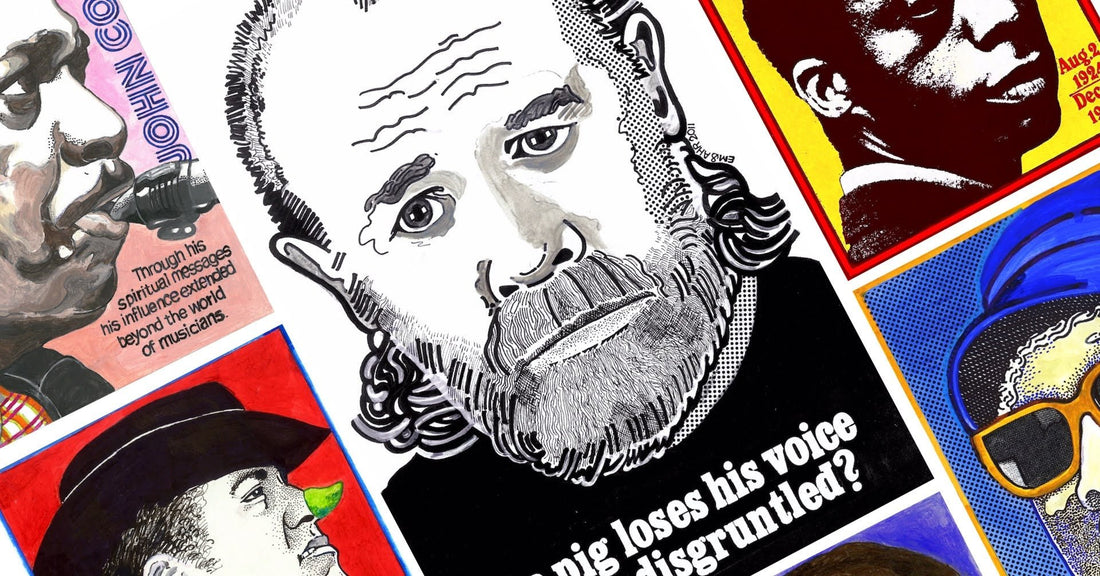
George Carlin: The Prophet of Comedy
Share
George Carlin: The Prophet of Comedy
George Denis Patrick Carlin was born on May 12, 1937, in Manhattan, New York, and grew up during a time when America was shifting rapidly in culture, politics, and values. From the beginning, Carlin was a rebel. Expelled from school multiple times and constantly butting heads with authority, he developed a sharp eye for hypocrisy and a sharp tongue to call it out. Those instincts, paired with his natural wit, would later make him one of the greatest comedians of all time.
Carlin began his career in the 1960s with a relatively tame act, performing on television shows like The Ed Sullivan Show. Clean-cut and playful, he earned laughs with impressions and clever wordplay. But Carlin felt stifled by the mainstream expectations of what comedy was “supposed” to be. By the end of the decade, inspired by the counterculture movement, he shed the suit-and-tie persona and embraced long hair, jeans, and a sharper, more confrontational style.
This transformation made him iconic. Carlin became the comedian who didn’t just tell jokes—he told truths, often uncomfortable ones. His legendary routine, “Seven Words You Can Never Say on Television,” pushed boundaries so hard it went all the way to the U.S. Supreme Court in the landmark case FCC v. Pacifica Foundation. The ruling restricted broadcasting “indecent” content, but the bit cemented Carlin as a fearless provocateur who refused to be silenced.
What made George Carlin the greatest wasn’t just his punchlines—it was his perspective. He wasn’t simply trying to make people laugh; he wanted to make them think. He dissected language, politics, religion, consumerism, and social norms with razor-sharp precision. Where others saw everyday life, Carlin saw absurdity. He mocked the way people blindly obeyed authority, the contradictions in American culture, and the hypocrisy of institutions.
Carlin’s comedy aged like prophecy. In specials such as Jammin’ in New York, Back in Town, and It’s Bad for Ya, he skewered everything from war and environmental destruction to the illusion of the American dream. His take on politicians—“They don’t care about you. At all.”—rings louder today than ever. His skepticism about media, corporations, and government surveillance feels almost eerily prescient in the digital age.
Unlike many comics, Carlin only got sharper as he got older. His material in the 2000s wasn’t lighter or safer; it was darker, angrier, and more brutally honest, but always funny. He used comedy as a weapon against lies and a mirror for society’s contradictions.
If George Carlin were alive today, he’d likely have a field day. Social media outrage, political tribalism, culture wars, endless advertising, and the 24/7 news cycle are all things he predicted and critiqued before they fully exploded. In today’s world, Carlin wouldn’t just be making jokes—he’d be starting riots of laughter and uncomfortable truth-telling.
Carlin passed away on June 22, 2008, at the age of 71. But his legacy endures. He was not just a comedian—he was a social commentator, philosopher, and cultural critic wrapped in the body of a stand-up.
What made George Carlin the greatest was simple: he told the truth in ways that made people laugh, think, and sometimes squirm. He once said, “Scratch any cynic and you’ll find a disappointed idealist.” That’s who Carlin was—someone who wanted humanity to be better, but who never let us forget how ridiculous we could be.
In a noisy world full of spin, Carlin’s voice remains timeless. He didn’t just make comedy—he made sense.
